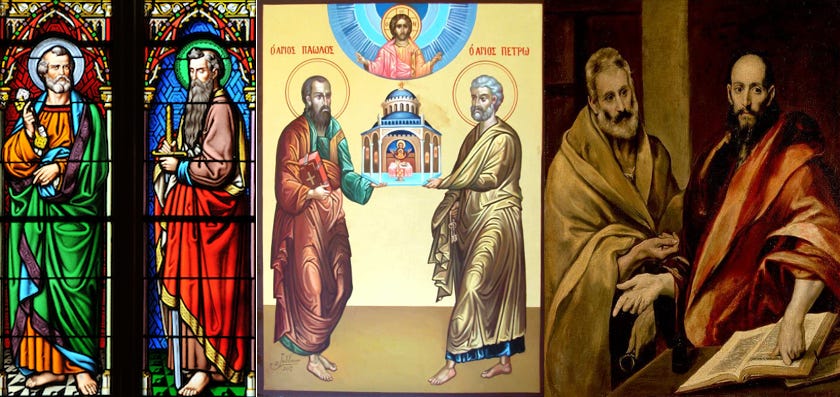The Rock and the Sword: Sts. Peter and Paul the Apostles
“When therefore they had dined, Jesus saith to Simon Peter: Simon son of John, lovest thou me more than these? He saith to him: Yea, Lord, thou knowest that I love thee. He saith to him: Feed my lambs.” —John 21:15
“And the Lord said to [Ananias]: Go thy way; for this man [Paul] is to me a vessel of election, to carry my name before the Gentiles, and kings, and the children of Israel.” —Acts of the Apostles 9:15
Today is the feast of Sts. Peter and Paul, often considered the greatest of the apostles. St. Peter was chosen by Jesus to lead both the other apostles and the Church, and St. Paul wrote much of the New Testament.
Simon Peter went from being a fisherman to a “fisher of men,” his new name “Peter” or “Rock” being given to him by Christ when He said (Matt. 16:17-19), after Peter affirmed His Messianic status, “Blessed art thou, Simon Bar-Jona: because flesh and blood hath not revealed it to thee, but my Father who is in heaven. And I say to thee: That thou art Peter; and upon this rock I will build my church, and the gates of hell shall not prevail against it. And I will give to thee the keys of the kingdom of heaven.”1 Enthusiastic, passionate, and volatile, Peter was among the three apostles (Peter, James, and John) who were closest to Jesus and present at key events such as the Transfiguration and the Agony in the Garden.
Peter denied Christ before the crucifixion but repented and again returned to terms of intimate friendship with Jesus after the Resurrection. He was martyred by crucifixion at Rome, where he established his principle see—it is said he was crucified upside down at his own request, because he did not feel worthy to die the same way his Divine Master had.
Paul, meanwhile, went from Saul the persecutor of Christians to Paul the Apostle to the Gentiles after being miraculously struck blind by a vision of Jesus and then cured. Paul went on to suffer dozens of hardships, including shipwreck, torture, and imprisonment, to convert an untold number of souls to the truth of the Gospel of Christ. In the midst of all his travels, Paul also wrote many letters, which make up much of the New Testament. Like Peter, Paul was martyred in Rome, though being a Roman citizen he was beheaded instead of crucified.
In a world that increasingly denies spiritual authority and accountability in the afterlife, St. Peter and his keys are a reminder that ultimately, we have only one Judge to Whom we must answer: God. And in a world that increasingly denies the reality of objective truth and vilifies Christians who refuse to compromise, St. Paul and his sword—the instrument of his martyrdom—are reminders of what we must suffer for Christ’s sake.
Both Peter and Paul took to heart the words of Jesus (Mark 8:36), “For what shall it profit a man, if he gain the whole world, and suffer the loss of his soul?”
Protestants often tie themselves in linguistic knots trying to avoid the obvious meaning of Matt. 16:18 by claiming that Jesus said to Simon, “You are Rock [Peter],” and then suddenly switching mid-sentence referred to himself or Peter’s faith with “upon this rock I will build my Church.” They will frequently bring up the Greek translation of this passage, where two slightly different words are used for rock, because “Peter/Πέτρος” is masculine (due to Peter’s being a male), and the second “rock,” because an ordinary noun, is feminine (πέτρᾳ). Jesus was speaking in Aramaic and Matthew almost certainly wrote in Hebrew or Aramaic, according to the ancient sources, however; in Aramaic, the exact same word is used: “You are Kepha, and upon this kepha I will build my Church.”



A fisherman and a tentmaker. What is impossible with men is possible with God. Entire world changed!! Today we finished the Apostle’s fast and celebrate these holy saints!!!